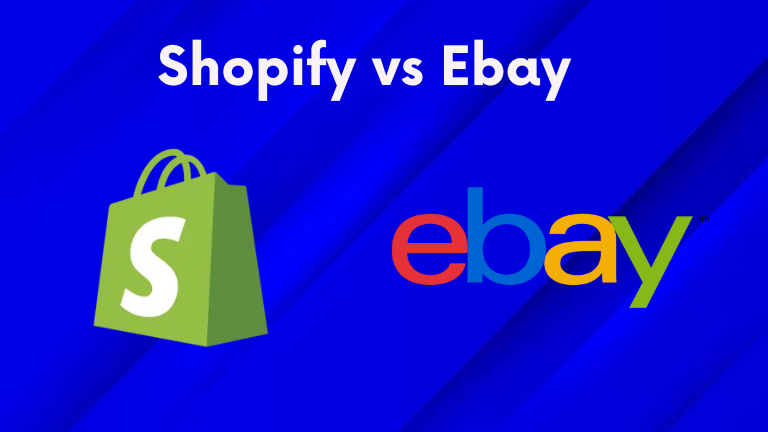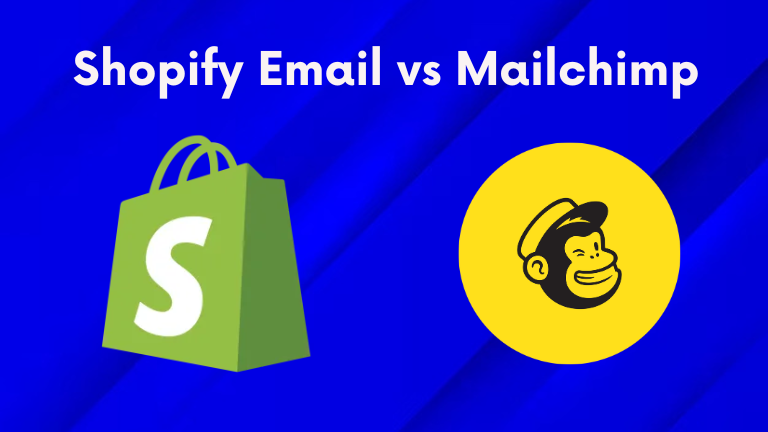
Email marketing is an essential, cost-effective strategy for businesses of all sizes. For small businesses, finding an affordable and efficient solution is crucial. Shopify Email vs Mailchimp are two popular options in the market. This detailed comparison will help you decide which tool is best for your needs.
What is Shopify Email?
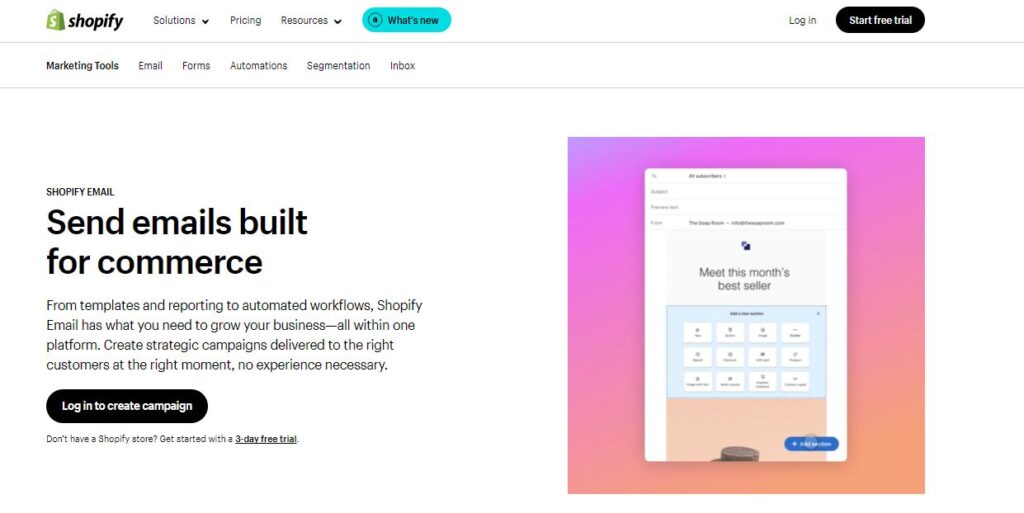
Shopify Email is an integrated email marketing tool designed specifically for Shopify users. It allows merchants to create, send, and manage email campaigns directly from their Shopify dashboard. Launched in 2020, Shopify Email is built to be user-friendly and offers seamless integration with Shopify’s ecommerce features.
Key Features of Shopify Email
Email Builder: The Shopify Email builder is intuitive and easy to use. It features a drag-and-drop interface that allows users to create and customize emails effortlessly. Users can add various content blocks, including text, images, products, and discount codes, to create visually appealing and effective emails.
Ecommerce Integration: One of the standout features of Shopify Email is its seamless integration with Shopify’s ecommerce platform. Users can directly add products from their store, as well as gift cards and discount codes, to their emails. This makes it easy to create targeted marketing campaigns that drive sales and engagement.
Analytics and Reporting: Shopify Email provides robust analytics and reporting tools that allow users to track the performance of their email campaigns. Users have the ability to track essential metrics like open rates, click-through rates, and conversion rates. Additionally, Shopify Email offers insights into customer behavior, such as the number of orders placed as a result of email marketing efforts.
Automation: While Shopify Email offers basic email automation templates, users can also create more complex, manual workflows using Shopify Flow. This tool is available with all of Shopify’s paid plans and allows users to set up triggers, conditions, and filters to create highly customized automation workflows.
Customer Support: Shopify Email offers 24/7 email and live chat support with its paid plans. For users on the Shopify Plus plan, priority support is also available. This guarantees that assistance is available to users at any time, day or night.
What is Mailchimp
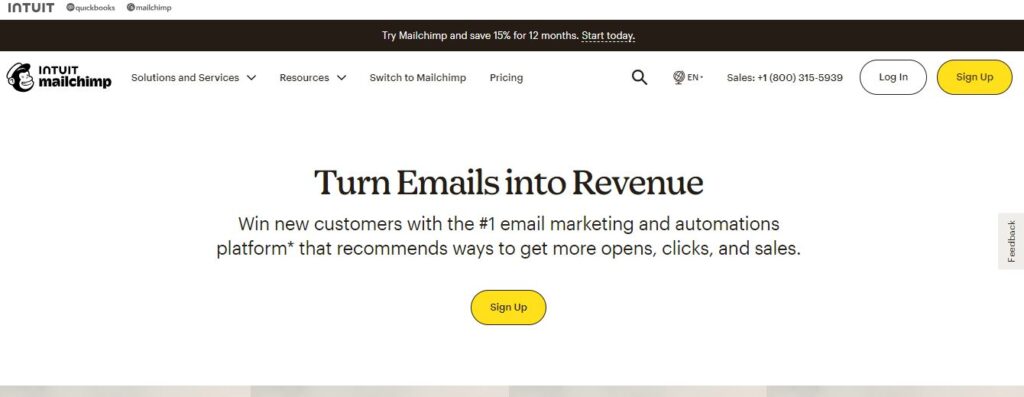
Mailchimp is a comprehensive email marketing platform that caters to a wide range of businesses. Founded in 2001, Mailchimp has evolved into a powerful tool that offers extensive features beyond just email marketing, including automation, landing pages, and more.
Key Features of Mailchimp
Email Builder: Mailchimp’s email builder is user-friendly and offers a variety of content blocks that can be easily added and customized. Users can choose between two builders: the new builder and the classic builder. Both builders provide a range of options for creating dynamic and engaging emails, including promo codes, product recommendations, and product content blocks.
List Building: Mailchimp offers built-in tools for building and managing email lists. Users can create landing pages and forms using Mailchimp’s landing page builder and form builder. These tools make it easy to capture email addresses and grow subscriber lists. Additionally, Mailchimp provides performance analytics for landing pages, helping users optimize their list-building efforts.
Segmentation and Targeting: Mailchimp excels in segmentation and targeting, offering comprehensive options for segmenting users based on various criteria. Users can create segments based on demographic details, how contacts were acquired, email and SMS activity, ecommerce activity, the likelihood of repeat purchases, and online behavior and engagement. Mailchimp also allows users to create in-depth segments by adding up to five conditions for each segment.
Automation: Mailchimp’s marketing automation features are robust and include over 70 prebuilt templates that can be customized and used to create automated workflows. The customer journey builder is easy to use and allows users to set triggers and conditions for sending automated emails. While the free plan offers limited access to automation features, the paid plans provide more extensive options.
Analytics and Reporting: Mailchimp offers comprehensive analytics and reporting tools that provide insights into email campaign performance, customer behavior, and more. Users can track metrics such as open rates, click-through rates, and unsubscribe rates, as well as social media and landing page engagement. Mailchimp also offers comparative benchmarking reports and A/B testing for emails.
Customer Support: Mailchimp provides 24/7 email and chat support for paid plan users. Users on the free plan have access to email support for the first 30 days. This ensures that users can get help when they need it, regardless of their plan.
Shopify Email vs Mailchimp: Feature Comparison
Costs and pricing
| Feature | Shopify Email | Mailchimp |
| Free Plan | First 10,000 emails per month | Up to 1,000 emails per month |
| Paid Plan 1 | $1 per 1,000 additional emails | Starts at $13 for 5,000 emails and 500 subscribers |
| Paid Plan 2 | N/A | Starts at $20 for 6,000 emails and 500 subscribers |
| Paid Plan 3 | N/A | Starts at $350 for 150,000 emails and 10,000 subscribers |
Mailchimp
Mailchimp’s pricing structure offers flexibility for businesses of all sizes. The free plan provides basic features and is suitable for small businesses with limited email marketing needs. The paid plans offer more advanced features and are scalable, making Mailchimp a good option for businesses looking to grow their email marketing efforts.
Shopify Email
But Shopify Email is an attractive option for small businesses and startups, as it allows them to send a significant number of emails each month without incurring additional costs. For businesses that need to send more than 10,000 emails per month, the cost remains affordable, making it a cost-effective solution for email marketing.
Email Builder Features
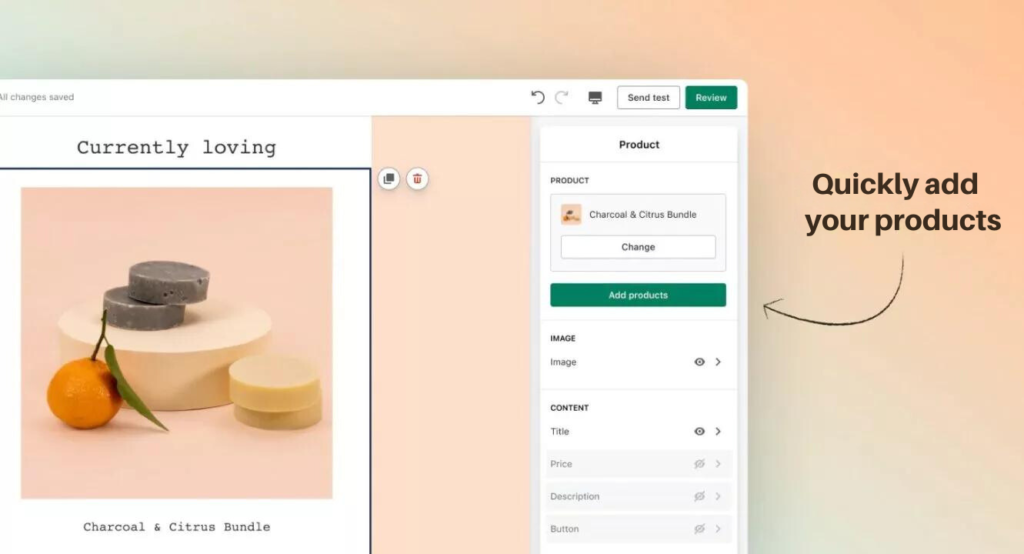
Both Shopify Email and Mailchimp are designed to be user-friendly, but Shopify Email has the advantage of seamless integration with the Shopify platform. This makes it easier for Shopify users to get started with email marketing without having to learn a new tool. Mailchimp, on the other hand, offers a more extensive set of features, which may require some time to learn and master.
| Feature | Shopify Email | Mailchimp |
| Ease of Use | Easy and intuitive | Easy and intuitive but may take time to learn all features |
| Content Blocks | Essential content blocks, including gift cards, products, and discount codes | Wide variety of content blocks, including promo codes and product recommendations |
| Dynamic Content | Limited dynamic content | Allows adding dynamic content blocks |
Email Templates
Shopify Email offers a straightforward and affordable pricing structure, making it an attractive option for small businesses and startups. Mailchimp’s pricing structure is more flexible and scalable, catering to businesses of all sizes. While Mailchimp’s paid plans offer more advanced features, Shopify Email provides a cost-effective solution for businesses with basic email marketing needs.
| Feature | Shopify Email | Mailchimp |
| Customizability | Customizable branded templates for various occasions | 100+ customizable templates, limited in free plan |
| Ease of Branding | Easy to add brand logos and colors | Easy to add branding to templates |
Marketing Automation
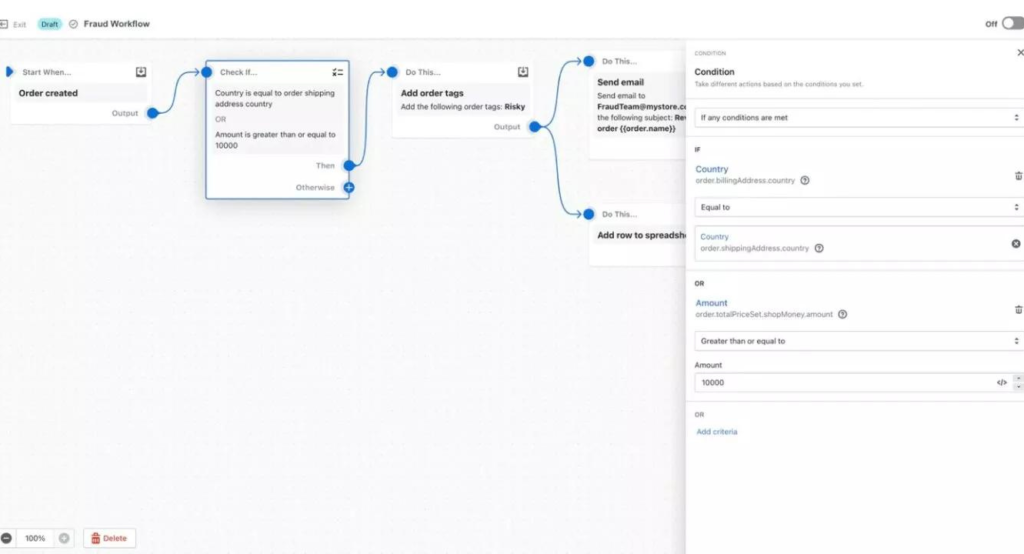
Shopify Email provides essential automation templates, with more advanced workflows available through Shopify Flow. Mailchimp excels with its customer journey builder, offering over 70 pre-built templates for easy customization. While both platforms support email automation, Mailchimp’s robust features make it more suitable for detailed marketing automation.
| Feature | Shopify Email | Mailchimp |
| Templates | Essential automation templates | 70+ pre-built templates |
| Custom Workflows | Requires Shopify Flow for advanced workflows | Customer journey builder for custom workflows |
| Channel Integration | Limited to email | Limited to email |
List Building Features
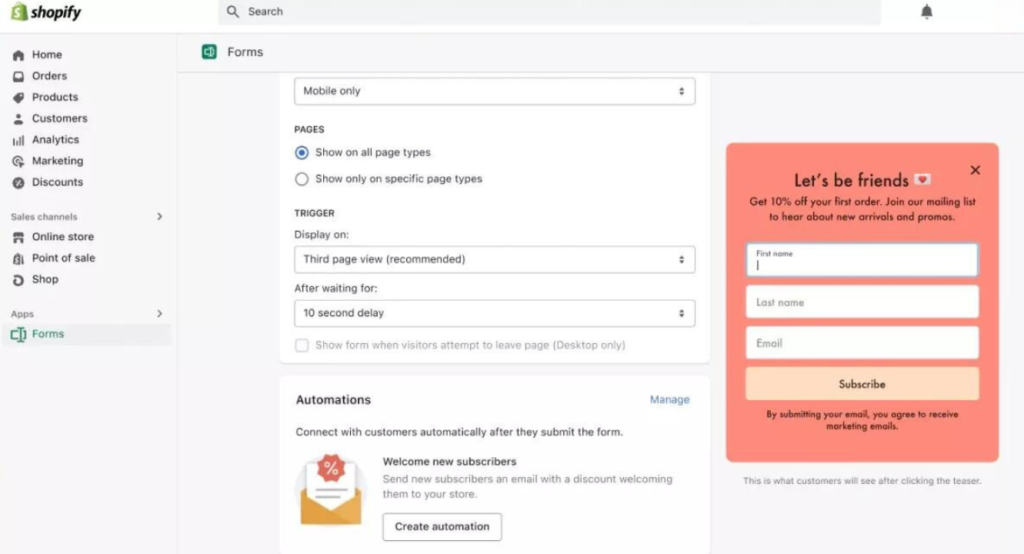
Shopify Email relies on the Shopify Forms app and third-party integrations for list building, offering basic email signup forms. Mailchimp, on the other hand, includes built-in landing page and form builders, complete with performance analytics. This makes Mailchimp more convenient for comprehensive list-building without additional plugins.
| Feature | Shopify Email | Mailchimp |
| Built-in Tools | No native tools, but has Shopify Forms app | Built-in landing page and form builders |
| Form Customization | Basic email signup forms | Themed templates and performance analytics |
Analytics and Reporting
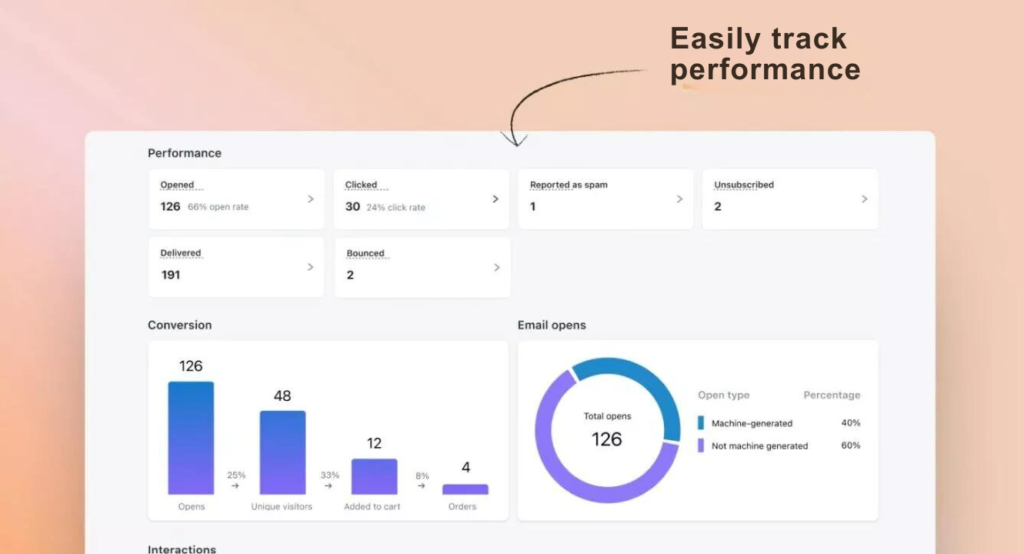
Shopify Email focuses on essential metrics and e-commerce insights, such as order tracking and marketing funnel behavior. Mailchimp offers broader analytics, including comparative reports and social media engagement tracking. Additionally, Mailchimp’s A/B testing feature allows for optimization of email campaigns, making it a more comprehensive tool for data-driven marketers.
| Feature | Shopify Email | Mailchimp |
| Basic Metrics | Open rate, click rate, unsubscribe rate | Open rate, click rate, unsubscribe rate |
| Ecommerce Insights | Order tracking, marketing funnel behavior | Basic ecommerce insights |
| Comparative Reports | No | Yes |
| A/B Testing | No | Yes |
Which One is Best for You?
Shopify Email is best for:
- Shopify Store Owners: Shopify Email is designed specifically for Shopify users and dropshippers, offering seamless integration with the platform. This makes it an ideal choice for Shopify store owners who want a simple and cost-effective email marketing solution.
- Basic Email Marketing Needs: Shopify Email is suitable for businesses with basic email marketing requirements. Its easy-to-use interface and essential features make it a good choice for businesses that do not need advanced customization or automation.
Tips💡: 25 Dropshipping Tips Every Beginner Must Know
Mailchimp is best for:
- Small Businesses: Mailchimp is a versatile and feature-rich platform that caters to a wide range of businesses. Its extensive features and flexible pricing options make it suitable for small businesses looking to grow their email marketing efforts.
- Advanced Marketing Strategies: Mailchimp offers robust automation and segmentation features, making it a good choice for businesses looking to implement more sophisticated marketing strategies. Its advanced tools and integrations support a wide range of marketing activities beyond email.
Final Considerations
Choosing between Shopify Email and Mailchimp depends on your specific needs. Shopify Email is perfect for Shopify users seeking a simple, cost-effective solution with excellent ecommerce integration. Mailchimp, on the other hand, offers extensive features and flexibility suitable for a wide range of businesses.
Start your Shopify Email with a free trial and see how it can streamline your email marketing efforts.

FAQ
Can I use Shopify Email without a Shopify store?:
No, Shopify Email is designed specifically for Shopify users.
Does Mailchimp offer a free plan?:
Yes, Mailchimp offers a free plan with limited features.
Which tool is better for advanced marketing automation?:
Mailchimp offers more advanced marketing automation features compared to Shopify Email.


